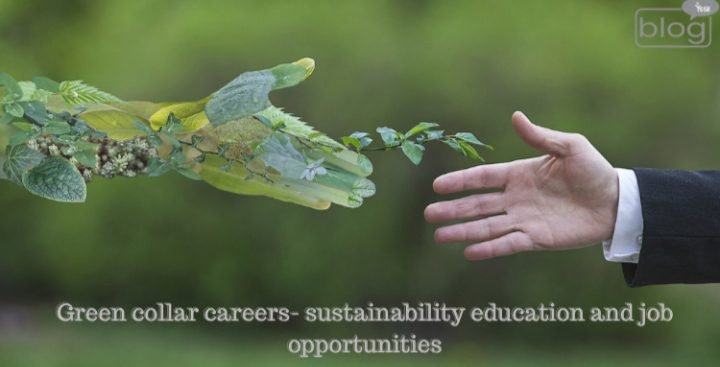Green collar careers :sustainability education and job opportunities
Green collar jobs have arisen as a ray of light for people looking for fulfilling work that also benefits the environment in an era of environmental concerns and increased awareness of the need for sustainable practices. These careers, which are frequently based in sustainability education, not only provide a wide range of employment options but also significantly contribute to the development of a more resilient and environmentally conscious global workforce.
What are Green Collar Jobs?
The phrase “green collar” refers to employment centered around protecting and rehabilitating the environment. These positions cover a wide range of sectors, including waste management, sustainable agriculture, and renewable energy and conservation. As society struggles with the effects of resource depletion and climate change, there is a growing need for qualified workers in these domains.
Education for Sustainability:
An important factor contributing to the rise of green collar jobs is the focus on sustainability education. Globally, educational establishments are realizing how critical it is to incorporate sustainability into their curricula in order to guarantee that graduates have the skills and knowledge required to tackle today’s environmental issues.
A wide range of academic fields are included in sustainability education, such as environmental science, green building design, sustainable business strategies, and renewable energy technologies. Today, a large number of universities provide specialized degrees and certifications that set students up for employment in green collar work and create a workforce that can lead sustainable development.
Green Collar Career Opportunities:
Green collar jobs provide a wide range of exciting and varied employment options. Let’s examine a few of the emerging industries that present opportunities for professionals with a focus on sustainability:
- Renewable Energy: The global movement to lessen dependency on fossil fuels has led to an unparalleled expansion in the renewable energy industry. People with knowledge of renewable energy technologies are leading the green revolution as solar and wind energy technicians and sustainable energy engineers work together.
- Sustainable Agriculture: The importance of sustainable agricultural techniques has grown as worries about environmental damage and food security have grown. Agronomists, permaculture designers, and consultants for sustainable farming are essential in creating and executing environmentally friendly farming practices.
- Environmental Conservation: Ecologists, environmental scientists, and conservationists strive to maintain ecosystems, conserve biodiversity, and lessen the negative effects of human activity on the environment. The delicate balance of the ecosystems in our world depends on their work.
- Waste Management: Recycling and waste reduction are critical components of the battle against environmental deterioration. Environmental engineers, waste management specialists, and recycling coordinators work to reduce the environmental impact of human consumption.
- Green Building Design and Construction: Sustainable techniques are becoming more and more integrated into building design and construction by architects, engineers, and construction professionals. The goal of green building experts is to design buildings that are resource-conscious, energy-efficient and environmentally benign.
Why Green Collar Jobs Are Beneficial:
In addition to being in line with environmental stewardship principles, choosing a green collar job has several advantages for both individuals and society as a whole. Due to the fact that their work helps create a more resilient and sustainable future, professionals in these disciplines frequently report higher levels of job satisfaction. Furthermore, it is anticipated that careers in green collar work will be more resilient to economic downturns, offering a secure and promising path to long-term employment.
In summary, Green collar jobs are now a vital part of the global workforce as we move toward a more sustainable future. The introduction of sustainability education into traditional curricula and the increasing demand in many industries for eco-friendly practices highlight the significance of developing a workforce prepared to tackle urgent environmental issues.In light of our shared goal of creating a more sustainable and greener world, pursuing green collar jobs is not only a wise decision for those looking for meaningful work but also a critical first step in creating a resilient and peaceful coexistence with the environment.
To read more blogs, click here.
Writer
Sadia haque
Intern
content writing department
YSSE

